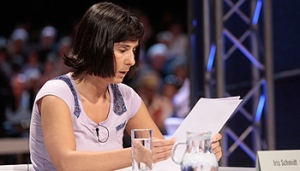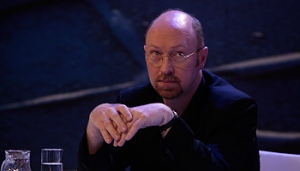 Iris Schmidt (Bild: Johannes Puch)
Iris Schmidt (Bild: Johannes Puch)
Iris Schmidt (G)
Iris Schmidt from Germany was invited by Elisabeth Keller and read from her text “Schnee” [snow]. Her text, slated by the jury as “Kafka rip-off” and “Stephen King for the poor”, will probably go down in FGLL history as the text that was worst received.
Sales representative ends up in a remote hotel in the woods
Schmidt’s text tells the story of Karl Müller, a pharmaceutical representative on a business trip who stops off at a remote hotel in the woods and soon notices: there is something very wrong here. An abandoned car outside the door, black silhouettes in the wood and suddenly his engine no longer works – and all the while, more and more snow is falling out of the sky.
There is no video portrait of the author, on her request
Reading
Discussion
Spinnen: “Very unstructured and clumsy”
Burkhard Spinnen took advantage of his privilege as “circus director” and was the first to take the floor only to pass it on again quickly: “I would like the discussion of this text to be very short and matter-of-factly”, said Spinnen. This text is “very unstructured and clumsy” and describes something “rather unimportant”. “That’s why I don’t wish to say any more about it” – there was even some minor applause from the audience in answer to this.
 Iris Schmidt (Bild: Johannes Puch)
Iris Schmidt (Bild: Johannes Puch)
Jandl: “Situation like in ‘Shining’”
“You have to be careful about hotels whose access route is not on a map”, said Paul Jandl. “A situation like in the film ‘Shining’ and – you have to mention the name – like in Kafka”. Even the access road in the text is “like in the Castle novel”, the staff is “demonic and stereotypical” and Karl is a “typical Kafka name”. The country hotel suspense is “not so badly crafted”.
 Alain Claude Sulzer (Bild: Johannes Puch)
Alain Claude Sulzer (Bild: Johannes Puch)
Sulzer: “A banal horror story”
“I share all my colleagues’ opinions”, said Alain Claude Sulzer, and then pointed out the “dramaturgic error” on “page 2”: there, Karl meets the two people who would need help but who would not even turn round to look at the driver – at this point, the text is “ruined”. “A banal horror story”, according to Sulzer.
Fleischanderl: “…and you believe it is literature”
“The craftsmanship is not much worse than some of the other texts here”, was Karin Fleischanderl’s judgement. The text is located at the “tepid centre”: “You acquire a little bit of your own style and are able to tell a story with a beginning, a middle and an end with a surprising twist and you believe it is literature.”
Winkels: “Stephen King for the poor”
Hubert Winkels: “If I were to say less than Burkhard Spinnen I would say: ‘Stephen King” for the poor” – whereupon Spinnen said: “I would not be able to bring myself to say this.”
 Burkhard Spinnen (Bild: Johannes Puch)
Burkhard Spinnen (Bild: Johannes Puch)
Feßmann: “Text entirely lacks singularity”
Meike Feßmann was “in principle of the same opinion” as her colleagues, but added by way of explanation “for those who manage to get something out of it”: “The reason the text angers us so much is because it lacks singularity, you can tell that the author wrote the text in a conventional way, the way she imagines literature to be like – namely like Kafka – which is why the reader cannot find anything interesting about it.”
Keller: “A nasty fairy tale”
“It is surprising how little the jury says today”, said Hildegard Elisabeth Keller, and then she explained why she invited this “well-crafted text”: “The story is an unobtrusive fantasy in white”, telling the story of a “field staff member”. With its “simplicity”, the text follows the popular clichés in a tongue-in-cheek way. This unresolved and therefore “nasty fairy tale” has a “home country pulp fiction-type quality” about it.
Barbara Johanna Frank
 TDDl 2010
TDDl 2010